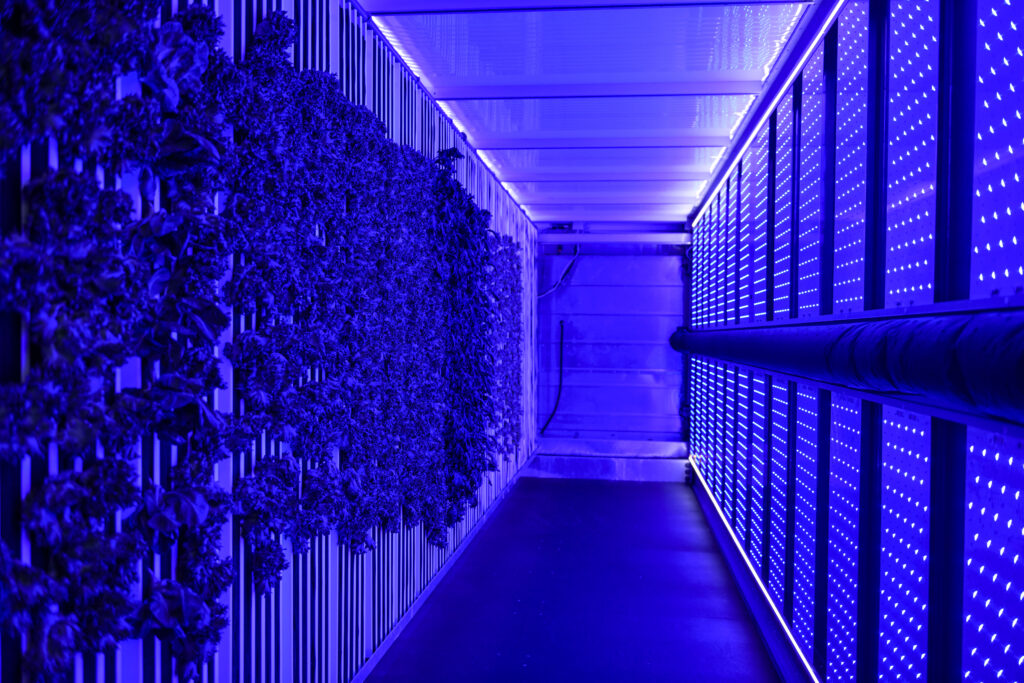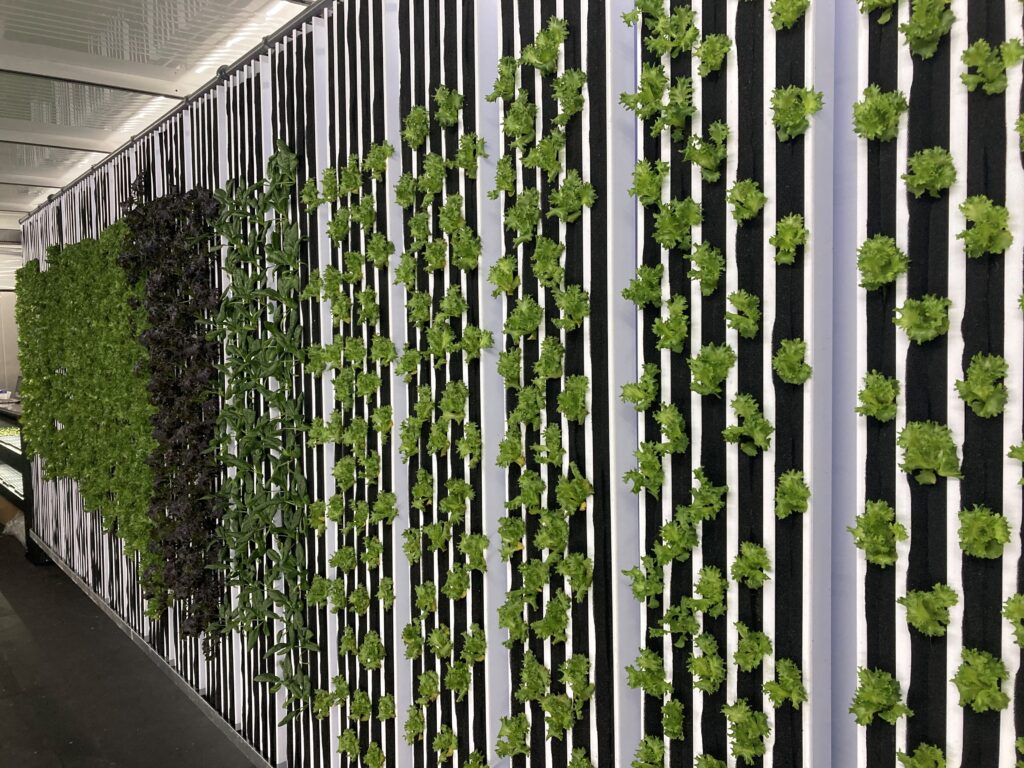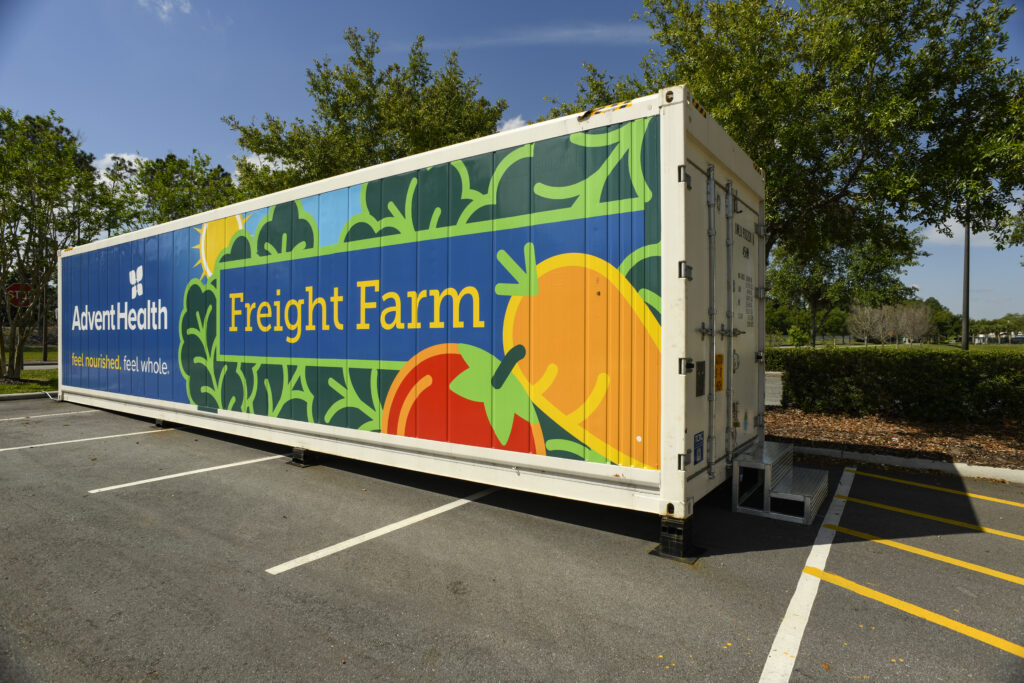AdventHealth Celebration’s Freight Farm Prioritizes Nutrition and Sustainability
by PAUL CATALA
While most of us associate the name AdventHealth with medical care, AdventHealth Celebration is proving the scope of care goes beyond medical services.
In a marriage of agriculture and technology, the acute-care facility serving Walt Disney World and Greater Orlando has begun freight farming.
In the facility’s south parking lot near the Nicholson Center, hospital administration has set up its 40-foot-by-8-foot Freight Farm. Freight Farms is a Boston-based agriculture technology company that manufactures and sells container farms — hydroponic farming systems assembled inside intermodal freight containers.
Chief Nursing Officer Patty Jo Toor and Christy Miller, director of the Wellness Center at AdventHealth Celebration, say the Freight Farm has been a growing success.
Toor, who’s worked at AdventHealth Celebration for 35 years, says she came up with the idea of putting a greenhouse on the hospital’s 48 acres about 10 years ago. But due to hospital growth and finding a place with sufficient sun, that idea floundered until she saw a TV program about Freight Farms.
“I felt like we had an opportunity with a Freight Farm to grow organic lettuce without any pesticides on it, which would help us to really move into an edible type of landscape,” says Toor, who adds that citrus trees and an herb garden already have been planted on the campus.
With support of the medical center’s staff and administration, AdventHealth Celebration received its Freight Farm in August 2021. The $100,000 structure was paid for by the AdventHealth Foundation.
AdventHealth is the first hospital in the southeastern United States to use Freight Farms’ technology to grow fresh, local, and sustainable food on-site, according to Randy Amil, agricultural specialist at AdventHealth Celebration.
Around the world, from Canada to the Middle East and other areas, there are more than 550 Freight Farms in 38 countries and 48 U.S. states and territories.
Miller says a lot of preparatory work needed to be done prior to installing the farm. Once the container was delivered, staff had to set up growing towers and plant seeds.
“It was operational but there were a few things we had to do to get it ready for actual planting,” says Miller, who is in her seventh year with AdventHealth Celebration.
In its Freight Farm, AdventHealth is growing varieties of leafy greens – kale, Bibb lettuce, and spinach, as well as herbs such as dill, cilantro, and basil. Miller says so far, staff manages to harvest 75 to 100 lettuce heads each week for the café.
So how does a Freight Farm work? After seeds are planted in plugs of peat moss and other organic matter, they are sprayed with an assortment of nutrients and water and placed under lights that produce artificial days and nights. Once the sprouts grow to about two inches, they are moved into the vertical towers of the freight farm, where water trickles down from plant to plant. LED lights help stimulate photosynthesis, and within six to eight weeks, the plants have gone from seed to being ready for harvest.
Although the Freight Farm is currently run by Miller and her medical center team members, a full-time farmer is being sought to operate it; the hospital currently is between farmers. In addition, Freight Farms developed “farmhand,” a software platform designed to allow hydroponic growers to control farm components remotely, automate some tasks, analyze growing data, and manage businesses. That software was originally developed for Freight Farms’ customers but can now be used with any hydroponic operation with a grow controller.
The lettuce grown in the Freight Farm is being used on the staff salad bar each week, and every other week, some of it is put into a food pantry for AdventHealth Celebration employees who need it. In the past, some of the lettuce was up for sale in the café but without a full-time farmer and not in full production, it currently isn’t being sold. A new farmer is expected to start by January.
“I’d like to see the farm really be producing more because we’re told we can get about 500 heads a week out of it, so we’re not really producing at the level we can,” Toor says. “The first priority is to really get it producing in the manner in which it can.”
In addition to growing produce for the hospital, future plans for use of AdventHealth Celebration’s Freight Farm may include therapeutic horticulture, which combines gardening and social services to help those with physical and mental health issues.
Other plans call for the Freight Farm to include educational outreach with medical center staff while collaborating with local communities to get more people to grasp the need for more sustainable food sources.



